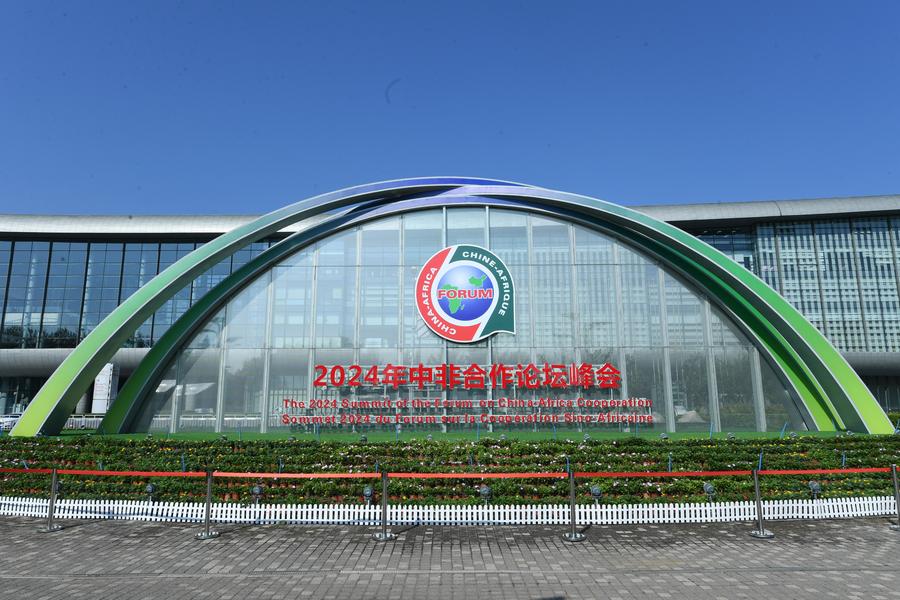


This photo taken on Aug. 29, 2024 shows the logo of the 2024 Summit of the Forum on China-Africa Cooperation (FOCAC) near China National Convention Center in Beijing, capital of China. (Xinhua/Ren Chao)
BEIJING, Sept. 4 (Xinhua) -- Chinese and African leaders have since Monday held a series of high-level meetings in the run-up to a milestone summit widely expected to guide their joint pursuit of modernization.
These discussions are by no means empty rhetoric. Concrete plans for cooperation in specific areas, including peanut exports, railway upgrade, and the use of satellite navigation technology, are on the agenda.
More can be expected when Chinese President Xi Jinping delivers a keynote speech at the Summit of the Forum on China-Africa Cooperation (FOCAC) on Thursday.
The FOCAC, as Xi put it, is an effective mechanism for advancing practical cooperation between China and Africa.
This reflects the principle of "sincerity, real results, amity and good faith" that constitutes the pillar of China's Africa policy.
"This principle emphasizes practical and effective cooperation over ambitious but unrealistic goals," said Guo Rui, vice dean of the Institute of National Development and Security Studies at Jilin University.
Underscoring "real results," Guo said China's approach is not just about promises but about tangible outcomes, focusing on Africa's actual needs.
Over the years, in its practical cooperation with African countries, China has specifically aimed to help them overcome three common bottlenecks in development: infrastructure deficits, talent shortages and financial constraints.
At the FOCAC summit in 2015, China put forward 10 major cooperation plans covering areas such as industrialization, agricultural modernization, infrastructure, financial services and green development, which were warmly received across the African continent.
The plans were fully implemented. They were followed up by eight major initiatives launched at the FOCAC summit in 2018, and nine programs announced at the opening ceremony of the 8th FOCAC ministerial conference held in Senegal in 2021.
Since the FOCAC was set up, Chinese companies have helped African countries build or upgrade more than 10,000 km of railways, nearly 100,000 km of highways, roughly 1,000 bridges, almost 100 ports and 66,000 km of power transmission and distribution lines, all of which have created arteries of connectivity across the continent.
Guinea-Bissau President Umaro Sissoco Embalo said China truly understands Africa and has consistently provided sincere assistance to Africa to accelerate its development, thus earning the trust and friendship of African countries and people.
According to a report released by Chinese authorities last week, China has remained Africa's largest trading partner for 15 consecutive years, and the proportion of China-Africa trade in Africa's total foreign trade has steadily increased.
Infrastructure projects spearheaded by China-Africa cooperation are spread across the continent, which have helped improve connectivity and socio-economic conditions on the continent, and propelled African industrialization, modernization and integration.
This year, collaboration on infrastructure has continued to flourish, marked by significant projects such as the successful launch of the last unit of six turbines at the Karuma Hydropower Plant in Uganda and the completion of phase one of the Thwake multipurpose dam in Kenya.
Data from China's Ministry of Commerce show that, as of the end of 2023, China's direct investment stock in Africa exceeded 40 billion U.S. dollars, making it one of Africa's major sources of foreign investment.
In the past three years alone, Chinese companies created more than 1.1 million jobs in Africa, according to the ministry.
"As a developing country itself, China understands Africa's most pressing needs, which is crucial for effective cooperation," said Tang Xiaoyang, dean of the Department of International Relations at Tsinghua University.
Food security and agricultural development remain key areas in the Belt and Road cooperation with African countries, said Xu Jianping, an official with China's National Development and Reform Commission.
He noted that, guided by strategic leadership from both sides, China-Africa agricultural cooperation has flourished, significantly increasing agricultural productivity and strengthening agricultural trade and cooperation mechanisms.
This year's FOCAC summit was held less than two months after China unveiled a slew of reform measures at the third plenum of the 20th Communist Party of China Central Committee.
"The plenum signals that the Chinese economy will focus more on innovation and technology, which will further energize China-Africa cooperation with more 'real results' in sectors such as renewable energy and digital technology," said Tang.
Meeting Sierra Leonean President Julius Maada Bio on Wednesday, Xi said China's overall plan to deepen reform and advance Chinese modernization will bring more opportunities to countries around the world, including those in Africa.
The summit is expected to make new contributions to the modernization of African countries and the building of a China-Africa community with a shared future, Xi said. ■
点击右上角![]() 微信好友
微信好友
 朋友圈
朋友圈

请使用浏览器分享功能进行分享
